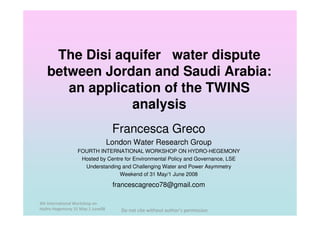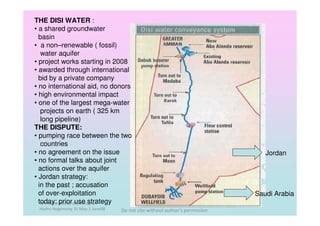Greco twins disi analysis 1997-2003
- 1. The Disi aquifer water dispute between Jordan and Saudi Arabia: an application of the TWINS analysis Francesca Greco London Water Research Group FOURTH INTERNATIONAL WORKSHOP ON HYDRO-HEGEMONY Hosted by Centre for Environmental Policy and Governance, LSE Understanding and Challenging Water and Power Asymmetry Weekend of 31 May/1 June 2008 francescagreco78@gmail.com 4th International Workshop on Hydro-Hegemony 31 May-1 June08 Do not cite without authorŌĆÖs permission
- 2. THE DISI WATER : ŌĆó a shared groundwater basin ŌĆó a nonŌĆōrenewable ( fossil) water aquifer ŌĆó project works starting in 2008 ŌĆó awarded through international bid by a private company ŌĆó no international aid, no donors ŌĆó high environmental impact ŌĆó one of the largest mega-water projects on earth ( 325 km long pipeline) THE DISPUTE: ŌĆó pumping race between the two countries ŌĆó no agreement on the issue Jordan ŌĆó no formal talks about joint actions over the aquifer ŌĆó Jordan strategy: in the past ; accusation of over-exploitation Saudi Arabia today: priorWorkshop on 4th International use strategy Hydro-Hegemony 31 May-1 June08 Do not cite without authorŌĆÖs permission
- 3. Trajectory of the Jordan ŌĆōSaudi Arabia Relation over the Disi Aquifer Low Cooperation Intensity High Confrontation Ad hoc Technical Risk-averting Risk-taking of Issue Low Non-politicized 1 Conflict Intensity Politicized 2 Securitized / Opportunitized 3 Violized 4 High 4th International Workshop on Hydro-Hegemony 31 May-1 June08 Do not cite without authorŌĆÖs permission
- 4. Trajectory of the Jordan ŌĆōSaudi Arabia Relation over the Disi Aquifer Low Cooperation Intensity High Confrontation Ad hoc Technical Risk-averting Risk-taking of Issue Low Non-politicized 1 1980s: a UNDP technical mission evaluates the aquifer Conflict Intensity Politicized 2 1990s: First Jordanian accusations of Saudi overexploitation Securitized / 2002: Declaration of Disi as a ŌĆ£state- Opportunitized 3 security issueŌĆØ ongoing: SILENTIZATION/time-gaining Violized 4 High 4th International Workshop on Hydro-Hegemony 31 May-1 June08 Do not cite without authorŌĆÖs permission
- 5. Trajectory of the Jordan ŌĆōSaudi Arabia Relation over the Disi Aquifer Low Cooperation Intensity High Confrontation Ad hoc Technical Risk-averting Risk-taking of Issue Low Non-politicized 1 1980s: a UNDP technical mission evaluates the aquifer Conflict Intensity Politicized 2 1990s: First Jordanian accusations of Saudi overexploitation Securitized / 2002: Declaration of Disi as a ŌĆ£state- Opportunitized 3 security issueŌĆØ ongoing: SILENTIZATION/time-gaining Violized 4 High 4th International Workshop on ŌĆ£verbal violenceŌĆØ and ŌĆ£silentizationŌĆØ Rather Hydro-Hegemony 31 May-1 June08 Do not cite without authorŌĆÖs permission
- 6. high THE ECONOMIC NEXUS Robustness of Political Economy Low Cooperation Intensity High Low Confrontation Ad hoc Technical Risk-averting Risk-taking of Issue Low Non-politicized 1 Conflict Intensity Politicized 2 Securitized / Opportunitized 3 Violized 4 High 4th International Workshop on Hydro-Hegemony 31 May-1 June08 Do not cite without authorŌĆÖs permission
- 7. 1 high high 45 65 110 medium Robustness of Political Economy: 130 low Low 195 Confrontation Ad hoc Technical Risk-averting Risk-taking of Issue Non-politicized 1 Politicized 2 Securitized / Opportunitized 3 Violized 4 RANKING OF GDP PER HEAD from the Highest ( n.1) to the Lowest: n. 195 ( 195=TOTAL n. of COUNTRIES worldwide) Source:WB 2007 4th International Workshop on Hydro-Hegemony 31 May-1 June08 Do not cite without authorŌĆÖs permission
- 8. 1 high high 45 Robustness of 65 Political Economy: 110 medium 130 low 195 Low Confrontation Ad hoc Technical Risk-averting Risk-taking of Issue Non-politicized 1 Politicized 2 Securitized / Opportunitized 3 Violized 4 4th International Workshop on Hydro-Hegemony 31 May-1 June08 Do not cite without authorŌĆÖs permission
- 9. 1 high high 45 65 Robustness of 110 medium Political Economy: 130 low 195 Low Confrontation Ad hoc Technical Risk-averting Risk-taking of Issue Non-politicized 1 Drivers for COOPERATION Politicized 2 Securitized / Opportunitized 3 Violized 4 4th International Workshop on Hydro-Hegemony 31 May-1 June08 Do not cite without authorŌĆÖs permission
- 10. 1 high high 45 65 Robustness of 110 medium Political Economy: 130 low 195 Low Confrontation Ad hoc Technical Risk-averting Risk-taking of Issue Non-politicized 1 Drivers for COOPERATION T LIC Politicized 2 F ON fC o Securitized / 3 rs Opportunitized ive Dr Violized 4 4th International Workshop on Hydro-Hegemony 31 May-1 June08 Do not cite without authorŌĆÖs permission
- 11. 1 high high 45 65 110 medium 130 low 195 Low Confrontation Ad hoc Technical Risk-averting Risk-taking of Issue Non-politicized 1 Drivers for COOPERATION T LIC Politicized 2 F ON fC o Securitized / 3 rs Opportunitized ive Dr Violized 4 As mentioned before: silent conflict and non-acting upon the issue. Time-play as strategy of conflict over a shared resource 4th International Workshop on Hydro-Hegemony 31 May-1 June08 Do not cite without authorŌĆÖs permission
- 12. 1 high high 45 65 Robustness of 110 medium Political Economy: 130 low 195 Low Confrontation Ad hoc Technical Risk-averting Risk-taking of Issue Non-politicized 1 BARGAINiNG POWER Politicized 2 IDEATIONAL Securitized / Opportunitized 3 POWER COERCIVE POWER Violized 4 4th International Workshop on THE THE FACE OF POWER: non-violent coercive power Hydro-Hegemony 31 May-1 June08 Do not cite without authorŌĆÖs permission
- 13. 1 high high 45 65 Robustness of 110 medium Political Economy: 130 low 195 Low Confrontation Ad hoc Technical Risk-averting Risk-taking of Issue Non-politicized 1 T LIC Politicized 2 F ON fC o Securitized / 3 rs Opportunitized ive Dr COERCIVE Violized POWER 4 Non violent conflict, 4th International Workshop on economic gap, coercive power , many drivers of conflicts. Hydro-Hegemony 31 May-1 June08 Do not cite without authorŌĆÖs permission
- 14. Evaluation of the TWINS analysis: ŌĆó good for historical patterns analysis of conflicts ŌĆó useful for combinating economical and political issues together ŌĆóApproximative for the economic part ( economic robustness ranking is one-dimention-data only, and this implies the utilization of a one-dimentional indicator) ŌĆó good tool for comparing case studies 4th International Workshop on Hydro-Hegemony 31 May-1 June08 Do not cite without authorŌĆÖs permission
- 15. Thank you for your attention ! francescagreco78@gmail.com 4th International Workshop on Hydro-Hegemony 31 May-1 June08 Do not cite without authorŌĆÖs permission















